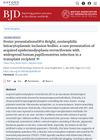30 citations,
June 1993 in “The Journal of Cell Biology” The oncoprotein causes abnormal hair growth without increasing skin cancer risk.
29 citations,
October 2020 in “Environmental health perspectives” Five preservatives may disrupt hormone function and need more health and environmental risk assessment.
22 citations,
July 2016 in “Cellular and Molecular Life Sciences” Genetic changes in mice help understand skin and hair disorders, aiding treatment development for acne and hair loss.
14 citations,
April 2016 in “PloS one” The KRTAP11-1 gene promoter is crucial for specific expression in sheep wool cortex.
3 citations,
February 2018 in “Experimental and Molecular Medicine/Experimental and molecular medicine” A protein called PCBP2 controls the production of a hair growth protein by interacting with its genetic message and is linked to hair loss when this control is disrupted.
 1 citations,
December 2022 in “Archives of Dermatological Research”
1 citations,
December 2022 in “Archives of Dermatological Research” Acne treatment with isotretinoin increases the presence of p53, a protein, in skin and oil glands, which may help reduce acne severity.
 October 2024 in “Biology”
October 2024 in “Biology” Dermal papilla cells can help regrow hair and are promising for hair loss treatments.
 July 2024 in “International Journal of Molecular Sciences”
July 2024 in “International Journal of Molecular Sciences” Nannochloropsis salina fermented oil may help treat hair loss by promoting hair growth and reducing oxidative stress.
October 2023 in “Nutrients” Millet and wheat extracts may improve hair health and promote growth.
 April 2023 in “Advanced functional materials”
April 2023 in “Advanced functional materials” The study created a tool that mimics natural cell signals, which increased cell growth and could help with hair regeneration research.
 3 citations,
January 2008 in “Endocrine journal”
3 citations,
January 2008 in “Endocrine journal” A new mutation linked to partial Androgen Insensitivity Syndrome and prostate cancer was found in a patient unhappy with their female gender assignment.
 June 2024 in “British Journal of Dermatology”
June 2024 in “British Journal of Dermatology” A rare case of a transplant patient developing a skin condition linked to HPV-49.





